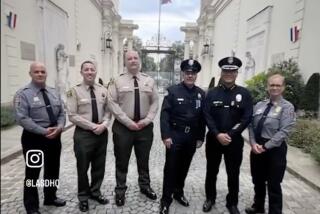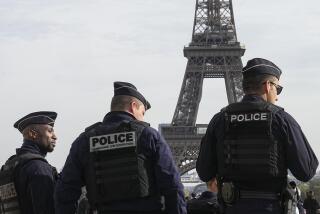Olympic Security Focuses on Reality
- Share via
ATHENS — The door burst open and nearly a dozen men dressed in black rushed inside, pistols and rifles at the ready.
A few steps in, through the first door on the left, the lead crew found a hostage. At close range, weapons erupted with a steady rat-tat-tat. Not a scratch, though, on the hostage. Simultaneously another crew entered another room. Another hostage. More shots, and in just seconds, a second safe rescue.
OK, said Maj. Stefanos Kozirakis, leader of the Greek police counter-terrorism team, a SWAT-style commando force. Well done, said Greece’s minister for public order, George Voulgarakis, who watched from close range, wearing headphones, sunglasses and a bulletproof vest.
The bullets that flew Wednesday at the sprawling Amygdaleza police training facility northwest of Athens were real, part of a training exercise for the 2004 Summer Olympics, which open Aug. 13. The people acting as hostages were real too; the bad guys were paper targets.
Six hours a day, six days a week, the 200 commandos train for the Games. Members of the group said they hoped they would not be needed come August -- that the massive security for the Games, costing $820 million and involving more than 50,000 Greek police and soldiers, deters the prospect of any terrorist attack.
But they also expressed confidence that they were up to any task. “We work hard and we are sure,” said George Gambellis, 37, an 11-year counter-terrorism force veteran and one of Kozirakis’ chief deputies.
“We are confident,” the 42-year-old Kozirakis, a commando unit member for nine years, said softly.
Foreign journalists got their first look Wednesday at some of the unit’s tactics.
“We want to show the world today that we are ready ... and we are prepared,” said police Col. Eleftherios Ikonomou, a ministry spokesman.
In concert with the U.S. and other nations, Greek police have been training extensively, including wide-ranging exercises in February and March. NATO also is expected to play a significant role in aiding the Greek security effort.
Officials familiar with Olympic planning said progress in securing the Games was evident. But they caution that the Games cannot be made 100% safe.
“The world as it is nowadays of course is different,” Oswald said here this week. “It is why we can not give any guarantees. But the guarantee we can give is that all efforts are made, and all the people and the organizations, including NATO, are quick to help.”
The team ran through a series of hostage-rescue drills -- exercises involving hostages in a car, building, bus and airplane.
In all instances, the gunfire was live. What about the possibility of an errant bullet? “I believe in my team. I believe in myself,” said sniper Sakis Stavropoulos, 31.
To demonstrate, Stavropoulos was asked to hit a target from 90 yards with one of his favorite weapons, an English-made rifle. To make matters more interesting, two fellow commandos flanked the target. Each wore a bulletproof vest but no headgear.
Stavropoulos fired twice, hitting the target both times. His squad mates did not even flinch.
“A sniper cannot miss,” Kozirakis said, adding that the display may have been too easy. Stavropoulos, he said, can put five bullets in a circle an inch across from 300 yards.
Voulgarakis, a former Greek navy commando who was installed as public order minister shortly after the March elections that saw conservatives oust the long-ruling socialists, said there was work yet to be done before the Games -- but there is also reason to believe that Greece, in concert with the U.S. and others, can build what he called a “shield” around the Games.
“I would like to invite all the people who believe the Olympic Games are a celebration to be here in Athens,” Voulgarakis said. “It will be a pleasure to have them here.”
More to Read
Sign up for Essential California
The most important California stories and recommendations in your inbox every morning.
You may occasionally receive promotional content from the Los Angeles Times.













